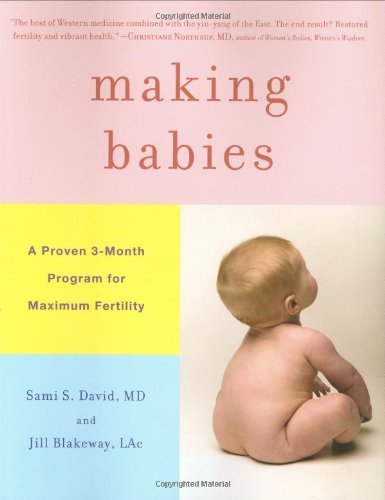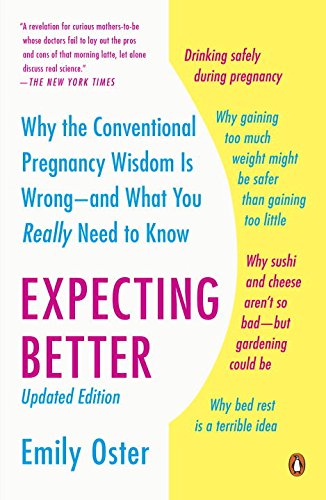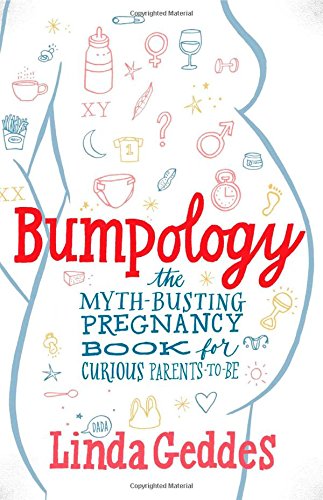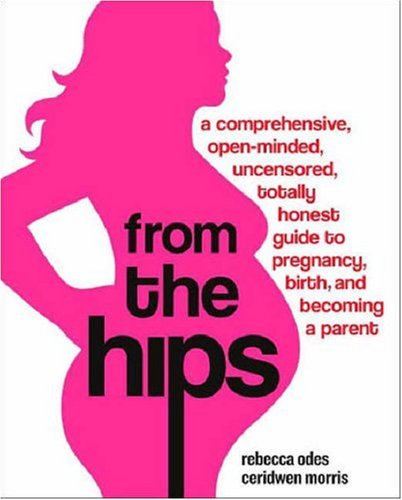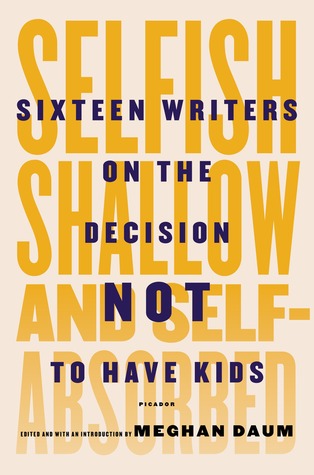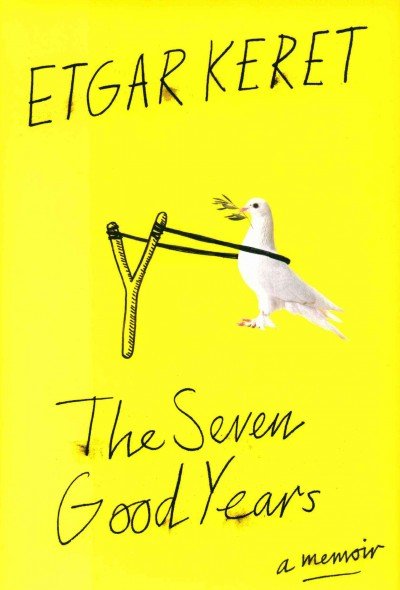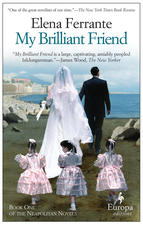New Reading Material for a New Era
/It has become somewhat of a pattern that before I begin something new, or as I anticipate a new phase in life, I read as much as I can on the forthcoming change. Fiction, nonfiction, journal articles, blog posts, etc. So in the case of a change that's so much more life-changing than anything I've ever taken on before, I clearly needed to read much more than I ever have. On the topic of pregnancy (because yep, I'm pregnant!), there is more than enough reading material to last one the entire time it would take to raise a child.
Of course, typically only people with a vested interest in the subject read such books, and (with the exception of Anne Lamott's Operating Instructions and Some Assembly Required--accounts of the early lives of her son and grandson, respectively) until I started to consider that I might someday want this miracle to happen did it occur to me to look in that particular section of the book store (or online retailer, as the case may be). The sheer number of pregnancy-related books is astonishing, and while many of them are useful, a number are not. Some paint a rosy picture of the whole experience and others make it sound unbearable. Unfortunately, many of the books on the market succeed by appealing to pregnant women's worst fears. And there are so many fears!
Below, I include my thoughts about the fertility, pregnancy, childbirth, and early parenthood books that I finished and found worthwhile to at least some degree. It was harder than I anticipated to find deep, heartfelt accounts of the experience as well as evidence-based advice.
Of the many myths floating around out there about pregnancy, none has been more notably irritating to me than the idea that you "glow." False! Wrong! There has been no such glowing in my case. Vomiting, yes. To be more precise, there's been intestine-convulsing, projectile-through-nose vomiting that leaves behind a nasty film of bile in the throat. Absolutely no glowing. If my comments appear tinged with some rage or despair, it's because there have been moments of both. People say that you forget the hard parts, but I don't think I'll forget puking in bed, or on the street, or in the bathtub.
It can seem, these 9 months and some additional days, like such a glamorous, romanticized time. In some ways it is glorious: having this little other person grow inside oneself is nothing less than incredible. In other ways it's a time full of tremendous physical change and anticipation of even more changes to come. If anyone ever needed a book for guidance, now is certainly the time.
Let's begin at the beginning!
Taking Charge of Your Fertility, Toni Weschler
Seriously, this is the best, most informative, most thorough book about all things fertility. It has everything you wish you already knew (or wish someone had told you) about a typical cycle, as well as how to understand your body's particular cycle. As a fertility expert, Weschler approaches the subject with a neutral tone. She doesn't assume much prior knowledge--which, given the state of sex-ed in this country, is fair. I liked having the Kindle version of this book because I could search for anything I needed, though at times it would have been useful to look at charts and diagrams in the paper version.
Making Babies: A Proven 3-Month Program for Maximum Fertility, Sami S. David, MD & Jill Blakeway, LAc
I borrowed this book from the library because, to be honest, its subtitle made me a bit skeptical of its claims. Really, three months? How can you be so sure? The authors, an obstetrician and an acupuncturist, frame the book around four different fertility types, and they then explain how to prevent as well as troubleshoot problems associated with each type. I ended up appreciating this book because it offered precise markers to look out for as well as questions and tests to bring up with your doctor. Also, they approach the body more holistically than some others do, with chapters about the endocrine and immune systems, for example. Brief vignettes throughout the book chronicle the (seemingly too easy to be true) remedies they tried for women struggling to become or stay pregnant.
Expecting Better, Emily Oster
Finally, finally! Actual evidence! Emily Oster trained as an economist and approached her pregnancy with that training in mind. When doctors told her "don't do such and such," she would ask about the risks, and they consistently failed to give her numbers of percentages. So, she looked into the studies upon which many pregnancy recommendations are based and found many of them flawed, outdated, or both. She approached pregnancy and all it entails as a series of decisions. In order to make good good decisions, she teaches her students that they need two things:
"First, they need all the information about the decision--they need the right data. Second, they need to think about the right way to weight the pluses and minuses of the decision for them personally. The key is that even with the same data, this second part--the weighing of the pluses and minuses--may result in different decisions for different people. Individuals may value the same thing differently." (xii-xiii)
The rest of her book provides the costs and benefits of many of the decisions that pregnant women make. In many cases (with the exception of smoking, in which case the evidence is clear that it is terrible to smoke), there is not one right answer, but a weighing of risks. This is why when people say, "Oh, you can't have X because you're pregnant," it makes me livid: this baby is part of my body, and I (as the fully formed, functional human) am making informed choices and taking calculated risks to have the best outcome for both me and my baby.
Oster debunks a number of myths through the book, such as that hair dye is toxic and sushi is dangerous. Both carry very minimal risks. It's difficult to determine exact risks for other decisions, such as whether or not to drink alcohol and how much caffeine is safe. While it's clear from numerous studies that both are harmful in excess, there are no randomized studies (due to ethical concerns) showing that low amounts of either are problematic, and there are some studies that show that moderate consumption can be beneficial. It's not as clear and tidy as the OB or society would like you to think!
Bumpology: The Myth-Busting Pregnancy Book for Curious Parents-To-Be, Linda Geddes
This Q&A format book has useful advice, though the style is not especially entertaining or enthralling. Most of the information can be found elsewhere, so it's nothing all that special, but the format does make it useful for looking up (or skipping) answers to certain unsavory questions. It's unfortunate that we need a myth-busting book, but we definitely do because there are so many myths out there. Geddes refers to recent research in her answers, which I appreciated, though I sensed a bias against the natural childbirth movement.
More importantly, she burst my red-hair-dream-bubble with the following:
"Hair color is similarly complex, with one exception: red hair. A gene called MCR1 seems to be the key player in deciding whether or not a child has red hair, and the flame-haired variant is recessive. This means that if a child has one copy of the red-hair variant and one copy of the non-red-hair variant, he will not have red hair (although he will be a carrier, so his children might have red hair— and carriers often have freckles)." (61)
From The Hips, Rebecca Odes & Ceridwen Morris
Written in a casual style with lots of graphics and bright colors, this book provides both medical information and useful advice. Nothing about it is particularly unique, though I did appreciate the blurbs it included from a women who had different experience dealing with the same things. It normalizes pregnancy by providing numerous alternative viewpoints. There were women who had no vomiting, ever, women who had relief precisely at twelve weeks, and women who threw up every day for the entire pregnancy. When you read From The Hips, you feel like you're reading a magazine--and sometimes that is a welcome relief from the doom and gloom books and the books with the front-seat color photos of birth.
My Pregnancy, Virginia Beckett, MD (editor)
This is a DK book, which means it's full of color photos and diagrams--some of which I wanted to see, and some of which I didn't welcome quite so much. But it's incredibly comprehensive, up to date, and neutral. It's not trying to persuade anyone to do anything. It tells you when to seek more tests and when not to worry. I like it much more than the pregnancy apps that tell you what size fruit your baby is comparable to in a given week because it's not trying to sell me anything or encourage me to participate in some inane forum. It's similar to From The Hips, but better; if I were to get only one, I would get this one.
Making Babies: Stumbling into Motherhood, Anne Enright
I found this book when I was searching the library catalogue for the other Making Babies book. This one popped up, too, and I thought I would give it a try because Anne Enright is a famous author who had won the Man Booker Prize. Well, I just didn't get into it. I had high hopes, but the style didn't suit me. Maybe she was too far removed from the experience to capture it without portraying it in an overly sentimental way? I gave up a chapter or two in. I probably was just irritated that she used these long, flowing sentences to write about pregnancy when all I could think of was vomiting. I have to say, the cover freaks me out a bit. Let me know if you find something redeeming in it, please!
Mama Tried: Dispatches from the Seamy Underbelly of Modern Parenting, Emily Flake
This book had me laughing SO hard. Flake's drawings are impressive, and so much more realistic than, say, any others you can find anywhere. She writes and illustrates scenes of the seamy, unpalatable trials of pregnancy and birth with running commentary on how society perceives pregnant women. For example:
"I have been steeped in a culture designed to make me view my pregnancy and my child as amazing, an incredible journey, a wildly difficult and world-changing thing. Bullshit. I'm just another lady that had a goddamn kid, and so you are, and so is everybody else" (40).
And it just tickled me how she makes fun of luxury baby goods and placenta encapsulation (see below), which maybe you wish you could un-know. Sorry ...
Waiting for Birdy, Catherine Newman
Catherine Newman wrote this book during her pregnancy with her second child, affectionately dubbed "Birdy." I couldn't put this book down; it so accurately captured my experience with pregnancy. For example:
"Sometimes, during the late afternoon especially, I feel so genuinely rotten that I worry it won't ever end, not even after the baby's born. I worry that I will always feel like throwing up, and that, for the rest of my life, that's all I'll have to talk about." (Loc. 280)
And her take on conventional pregnancy wisdom and all the advice given to women is likewise refreshing in its honesty. Here she finds herself grumbling about a line from the famous pregnancy book, What To Expect When You're Expecting, which several people thankfully advised me to avoid.
"And that whole “best bite” pregnancy diet? Please. “Is that the very best bite for the baby?” Michael likes to tease when I’m hunched like a criminal over a bag of gummy bears. “Be sure to indulge yourself at least once a week,” the book advises. “A fruited yogurt makes a nice treat.” A fruited yogurt! As if. A pound of cookie dough washed down with a quart of half-and-half— now that makes a nice treat." (Loc. 1299)
Misconceptions: Truth, Lies, and the Unexpected on the Journey to Motherhood, Naomi Woolf
This was my first Naomi Woolf book, and I have to say, this woman is opinionated. And for good reason! She put words to the irritation I feel when people (and doctors) act like you, the pregnant lady, would do something unreasonable to put your baby at risk, when she said it's as though society is trying to protect the unborn baby from you, its mother. I returned the book to the library a while ago, otherwise I'd quote something about how society thinks pregnant women are public property. At times, the book rambled, but the message is worth considering--especially when there are crazies out there like Texas State Rep. Dan Flynn (whom Samantha Bee so beautifully skewered) and Indiana Governor Mike Pence whose recent actions motivated quite the Twitter campaign.
Understanding Your Moods When You're Expecting, Lucy J. Puryear, MD
Thank goodness for this book! Lucy Puryear, a reproductive psychiatrist, is versed in all the things that can go awry in one's mind when creating life. It's a shame that this book isn't more widely distributed or advertised, as I think it would help a lot of women realize that what they are feeling is actually quite normal and natural--and that those feelings only grow more intense if you try to suppress them. She provides numerous anecdotes of successful treatment of pregnant and postpartum women that provide hope and rational thought, both of which are useful, even if everything is going smoothly. I found a very cheap used copy through Better World Books, though I would pay full price for it now that I know what's in it.
Great with Child: Letters to a Young Mother, Beth Ann Fennelly
I loved, loved, loved this book. I bought this book several years ago when I had a hankering for a dog and my mom thought I wanted a baby. Ha! I really just wanted a dog then, so I didn't end up reading it. But I was so thankful for it when I found it on my shelf a few weeks ago. Beth Ann Fennelly is a poet who writes letters to a young former student who has just married, become pregnant, and moved to Alaska, where she knows nobody. Fennelly writes her frequent letters about raising children, the discomforts of pregnancy, and the story of her first child's birth. This is the heartfelt book about having a child that I was looking for.
For example, in describing to her friend what being a mother does to you, she writes,
"First, you understand yourself as lodged in history in a way you didn't before. Your beliefs will be tested, your hypotheses put into action, so you'll consider them in a new way. Whether you're explaining where pets go when they die or teaching your child to recycle, your philosophies have ramifications. For the rest of history, echoes of your voice will be heard." (20)
Bringing up Bebe, Pamela Druckerman
So many people have written about this book that there is not much left to say. I enjoyed Druckerman's self-deprecating perspective as she related her attempts to raise her three children in France. By the end, I wanted to be French! I will say, though, that it made me skeptical of snacks. Now, when I see kids eating in strollers, at the park, or on the bus, I silently judge them, even though their parents probably have a good reason for feeding them at those times. I just think to myself that we should all be like the French and have three elegant meals every day. I think there is some useful wisdom here, though it's easy to get frustrated at America after reading it. I actually listened to this book on Audible, and it was easy to follow along, though the narrator's attempts to approximate a French person speaking English were amusing, if not annoying, at times.
Birth Day, Mark Sloan, MD
I'm not exactly sure how I happened to find this book (because I'm not reading about birth just yet), but I'm glad I did. Dr. Sloan, a hospital-based pediatrician, has made a career out of working with newborns and their families. In this book, he provides history and commentary on the evolution of the human head, the first few minutes after birth, pain relief options, fathers, and how doctors examine newborns. His narrative style makes for compelling reading, and I found myself unable to put the book down.
The most interesting chapters to me were those on the discovery and spread of pain relief options for women in labor and doctors' reluctance to adapt their methods. I also learned, to my dismay, that one of the pain relief options available to women outside the US (with the exception of one hospital in San Francisco), nitrous oxide, is not an option at the hospital where I will deliver.
"Nearly half the women in Finland, Sweden, and Canada inhale nitrous oxide during labor, and over 80 percent of them feel that it was at least somewhat helpful. [...] As we've seen, it's a moderately effective pain reliever, easy to administer, inexpensive, safe for mother and baby, and all the rage in most of the rest of the Western world." (147)
It's seen as a "good enough" option in many places, with fewer side effects than epidurals. Yet, due to the overwhelming prevalence of epidurals here and the fact that there is no money to be made on nitrous oxide, it's unlikely that we will see it here anytime soon. I find this infuriating. I'm convinced that if men were the ones giving birth, the problem of pain would have long ago been solved.
A Life's Work, Rachel Cusk
I read Rachel Cusk's recent novel Outline a month or two ago, and when I found out that she had written a book on motherhood, I knew I had to have it. Cusk has some of the humor of Flake mixed the political outlook of Wolf, though her narrative feels more literary (and sometimes requires a bit of work to understand). She tells her story in scenes, so it doesn't have the comprehensive feel of some of the other books on this list.
Weaving social commentary into her thoughtful reflections on her experiences of birth and early parenthood, Cusk both exposes her flaws and lays criticism where it belongs. In particular, she's spot on that being pregnant can make you feel like you're under someone else's watch and that you're not even a person yourself anymore:
"Modern pregnancy is governed by a regime breathtaking in the homogeneity of its propaganda, its insignia, its language. No Korean cheerleading team was ever ruled with so iron a rod as pregnant women in the English-speaking world." (24-5)
I promise that parts of this book exude Cusk's delight, but the more fun parts to quote are those that reveal her bewilderment. In "Colic and Other Stories," she writes about how she tries to quiet her baby:
"We go to the bathroom, where I intend to change her nappy. Again, this strategy has worked before, although I am unsure why. I lie her down on the mat. Immediately the crying stops. Delighted at the speed with which I have disarmed her, I sit down on the bathroom floor and lean back against the wall. [...] I pick her up. Immediately she roars. I put her down again. She stops. [...] I try picking her up again in the hopes that something has changed, but it hasn't. She roars. When I put her down, she stops. I wonder whether it is possible to spend the whole day in the bathroom." (63-4)
What I like about Cusk is that she is honest without being self-pitying and vulnerable without being self-satisfied. She relays her experience as it felt to her, whether painful, frustrating, or pleasurable. She doesn't make pregnancy and parenthood out to be a monolithic experience, and if I've learned anything so far, I know that it's different for each person.
P.S. This is my first post as an Amazon Affiliate. If my recommendation spurred you to purchase a book, I'd appreciate you using the image link directly from this page if you choose to purchase from Amazon. I receive a very small portion of the sale, and every little bit helps me maintain this blog. Of course, if you prefer to patronize your local library or an independent bookstore, I salute you! Thanks for reading!



